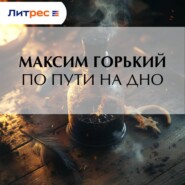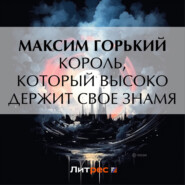По всем вопросам обращайтесь на: info@litportal.ru
(©) 2003-2024.
✖
The Man Who Was Afraid
Настройки чтения
Размер шрифта
Высота строк
Поля
It was a gray day. The sky, overcast with autumn clouds, was reflected in the water of the river, thus giving it a cold leaden colouring. Flashing in the freshness of its paint the steamer sailed along the monotonous background of the river like a huge bright spot, and the black smoke of its breath hung in the air like a heavy cloud. All white, with pink paddle-boxes and bright red blades, the steamer easily cut through the cold water with its bow and drove it apart toward the shores, and the round window-panes on the sides of the steamer and the cabin glittered brilliantly, as though smiling a self-satisfied, triumphant smile.
“Gentlemen of this honourable company!” exclaimed Kononov, removing his hat, and making a low bow to the guests. “As we have now rendered unto God, so to say, what is due to God, would you permit that the musicians render now unto the Emperor what is due to the Emperor?”
And, without waiting for an answer from his guests, he placed his fist to his mouth, and shouted:
“Musicians! Play ‘Be Glorious!’”
The military orchestra, behind the engine, thundered out the march.
And Makar Bobrov, the director and founder of the local commercial bank, began to hum in a pleasant basso, beating time with his fingers on his enormous paunch:
“Be glorious, be glorious, our Russian Czar – tra-rata! Boom!”
“I invite you to the table, gentlemen! Please! Take pot-luck, he, he! I entreat you humbly,” said Kononov, pushing himself through the dense group of guests.
There were about thirty of them, all sedate men, the cream of the local merchants. The older men among them, bald-headed and gray, wore old-fashioned frock-coats, caps and tall boots. But there were only few of these; high silk hats, shoes and stylish coats reigned supreme. They were all crowded on the bow of the steamer, and little by little, yielding to Kononov’s requests, moved towards the stern covered with sailcloth, where stood tables spread with lunch. Lup Reznikov walked arm in arm with Yakov Mayakin, and, bending over to his ear, whispered something to him, while the latter listened and smiled. Foma, who had been brought to the festival by his godfather, after long admonitions, found no companion for himself among these people who were repulsive to him, and, pale and gloomy, held himself apart from them. During the past two days he had been drinking heavily with Yozhov, and now he had a terrible headache. He felt ill at ease in the sedate and yet jolly company; the humming of the voices, the thundering of the music and the clamour of the steamer, all these irritated him.
He felt a pressing need to doze off, and he could find no rest from the thought as to why his godfather was so kind to him today, and why he brought him hither into the company of the foremost merchants of the town. Why had he urged so persuasively, and even entreated him to attend Kononov’s mass and banquet?
“Don’t be foolish, come!” Foma recalled his godfather’s admonitions. “Why do you fight shy of people? Man gets his character from nature, and in riches you are lower than very few. You must keep yourself on an equal footing with the others. Come!”
“But when are you going to speak seriously with me, papa?” Foma had asked, watching the play of his godfather’s face and green eyes.
“You mean about setting you free from the business? Ha, ha! We’ll talk it over, we’ll talk it over, my friend! What a queer fellow you are. Well? Will you enter a monastery when you have thrown away your wealth? After the example of the saints? Eh?”
“I’ll see then!” Foma had answered.
“So. Well, and meanwhile, before you go to the monastery, come along with me! Get ready quickly. Rub your phiz with something wet, for it is very much swollen. Sprinkle yourself with cologne, get it from Lubov, to drive away the smell of the kabak. Go ahead!”
Arriving on the steamer while the mass was in progress, Foma took up a place on the side and watched the merchants during the whole service.
They stood in solemn silence; their faces had an expression of devout concentration; they prayed with fervour, deeply sighing, bowing low, devoutly lifting their eyes heavenward. And Foma looked now at one, now at another, and recalled what he knew about them.
There was Lup Reznikov; he had begun his career as a brothel-keeper, and had become rich all of a sudden. They said he had strangled one of his guests, a rich Siberian. Zubov’s business in his youth had been to purchase thread from the peasants. He had failed twice. Kononov had been tried twenty years ago for arson, and even now he was indicted for the seduction of a minor. Together with him, for the second time already, on a similar charge, Zakhar Kirillov Robustov had been dragged to court. Robustov was a stout, short merchant with a round face and cheerful blue eyes. Among these people there was hardly one about whom Foma did not know something disgraceful.
And he knew that they were all surely envying the successful Kononov, who was constantly increasing the number of his steamers from year to year. Many of those people were at daggers’ points with one another, none of them would show mercy to the others in the battlefield of business, and all knew wicked and dishonest things about one another. But now, when they gathered around Kononov, who was triumphant and happy, they blended in one dense, dark mass, and stood and breathed as one man, concentrated and silent, surrounded by something invisible yet firm, by something which repulsed Foma from them, and which inspired him with fear of them.
“Impostors!” thought he, thus encouraging himself.
And they coughed gently, sighed, crossed themselves, bowed, and, surrounding the clergy in a thick wall, stood immovable and firm, like big, black rocks.
“They are pretending!” Foma exclaimed to himself. Beside him stood the hump-backed, one-eyed Pavlin Gushchin – he who, not long before, had turned the children of his half-witted brother into the street as beggars – he stood there and whispered penetratingly as he looked at the gloomy sky with his single eye:
“Oh Lord! Do not convict me in Thy wrath, nor chastise me in Thy indignation.”
And Foma felt that that man was addressing the Lord with the most profound and firm faith in His mercy.
“Oh Lord, God of our fathers, who hadst commanded Noah, Thy servant, to build an ark for the preservation of the world,” said the priest in his deep bass voice, lifting his eyes and outstretching his hands skyward, “protect also this vessel and give unto it a guarding angel of good and peace. Guard those that will sail upon it.”
The merchants in unison made the sign of the cross, with wide swings of their arms, and all their faces bore the expression of one sentiment – faith in the power of prayer. All these pictures took root in Foma’s memory and awakened in him perplexity as to these people, who, being able to believe firmly in the mercy of God, were, nevertheless, so cruel unto man. He watched them persistently, wishing to detect their fraud, to convince himself of their falsehood.
Their grave firmness angered him, their unanimous self-confidence, their triumphant faces, their loud voices, their laughter. They were already seated by the tables, covered with luncheon, and were hungrily admiring the huge sturgeon, almost three yards in length, nicely sprinkled over with greens and large crabs. Trofim Zubov, tying a napkin around his neck, looked at the monster fish with happy, sweetly half-shut eyes, and said to his neighbour, the flour merchant, Yona Yushkov:
“Yona Nikiforich! Look, it’s a regular whale! It’s big enough to serve as a casket for your person, eh? Ha, ha! You could creep into it as a foot into a boot, eh? Ha, ha!”
The small-bodied and plump Yona carefully stretched out his short little hand toward the silver pail filled with fresh caviar, smacked his lips greedily, and squinted at the bottles before him, fearing lest he might overturn them.
Opposite Kononov, on a trestle, stood a half-vedro barrel of old vodka, imported from Poland; in a huge silver-mounted shell lay oysters, and a certain particoloured cake, in the shape of a tower, stood out above all the viands.
“Gentlemen! I entreat you! Help yourselves to whatever you please!” cried Kononov. “I have here everything at once to suit the taste of everyone. There is our own, Russian stuff, and there is foreign, all at once! That’s the best way! Who wishes anything? Does anybody want snails, or these crabs, eh? They’re from India, I am told.”
And Zubov said to his neighbour, Mayakin:
“The prayer ‘At the Building of a Vessel’ is not suitable for steam-tugs and river steamers, that is, not that it is not suitable, it isn’t enough alone. A river steamer is a place of permanent residence for the crew, and therefore it ought to be considered as a house. Consequently it is necessary to make the prayer ‘At the Building of a House,’ in addition to that for the vessel. But what will you drink?”
“I am not much of a wine fiend. Pour me out some cumin vodka,” replied Yakov Tarasovich.
Foma, seated at the end of the table among some timid and modest men who were unfamiliar to him, now and again felt on himself the sharp glances of the old man.
“He’s afraid I’ll make a scandal,” thought Foma. “Brethren!” roared the monstrously stout ship builder Yashchurov, in a hoarse voice, “I can’t do without herring! I must necessarily begin with herring, that’s my nature.”
“Musicians! strike up ‘The Persian March!’”
“Hold on! Better ‘How Glorious!’”
“Strike up ‘How Glorious.’”
The puffing of the engine and the clatter of the steamer’s wheels, mingling with the sounds of the music, produced in the air something which sounded like the wild song of a snow-storm. The whistle of the flute, the shrill singing of the clarionets, the heavy roaring of the basses, the ruffling of the little drum and the drones of the blows on the big one, all this fell on the monotonous and dull sounds of the wheels, as they cut the water apart, smote the air rebelliously, drowned the noise of the human voices and hovered after the steamer, like a hurricane, causing the people to shout at the top of their voices. At times an angry hissing of steam rang out within the engine, and there was something irritable and contemptuous in this sound as it burst unexpectedly upon the chaos of the drones and roars and shouts.
“I shall never forget, even unto my grave, that you refused to discount the note for me,” cried some one in a fierce voice.
“That will do! Is this a place for accounts?” rang out Bobrov’s bass.
“Brethren! Let us have some speeches!”
“Musicians, bush!”
“Come up to the bank and I’ll explain to you why I didn’t discount it.”
“A speech! Silence!”
“Musicians, cease playing!”
“Strike up ‘In the Meadows.’”
“Madame Angot!”
“No! Yakov Tarasovich, we beg of you!”
“Gentlemen of this honourable company!” exclaimed Kononov, removing his hat, and making a low bow to the guests. “As we have now rendered unto God, so to say, what is due to God, would you permit that the musicians render now unto the Emperor what is due to the Emperor?”
And, without waiting for an answer from his guests, he placed his fist to his mouth, and shouted:
“Musicians! Play ‘Be Glorious!’”
The military orchestra, behind the engine, thundered out the march.
And Makar Bobrov, the director and founder of the local commercial bank, began to hum in a pleasant basso, beating time with his fingers on his enormous paunch:
“Be glorious, be glorious, our Russian Czar – tra-rata! Boom!”
“I invite you to the table, gentlemen! Please! Take pot-luck, he, he! I entreat you humbly,” said Kononov, pushing himself through the dense group of guests.
There were about thirty of them, all sedate men, the cream of the local merchants. The older men among them, bald-headed and gray, wore old-fashioned frock-coats, caps and tall boots. But there were only few of these; high silk hats, shoes and stylish coats reigned supreme. They were all crowded on the bow of the steamer, and little by little, yielding to Kononov’s requests, moved towards the stern covered with sailcloth, where stood tables spread with lunch. Lup Reznikov walked arm in arm with Yakov Mayakin, and, bending over to his ear, whispered something to him, while the latter listened and smiled. Foma, who had been brought to the festival by his godfather, after long admonitions, found no companion for himself among these people who were repulsive to him, and, pale and gloomy, held himself apart from them. During the past two days he had been drinking heavily with Yozhov, and now he had a terrible headache. He felt ill at ease in the sedate and yet jolly company; the humming of the voices, the thundering of the music and the clamour of the steamer, all these irritated him.
He felt a pressing need to doze off, and he could find no rest from the thought as to why his godfather was so kind to him today, and why he brought him hither into the company of the foremost merchants of the town. Why had he urged so persuasively, and even entreated him to attend Kononov’s mass and banquet?
“Don’t be foolish, come!” Foma recalled his godfather’s admonitions. “Why do you fight shy of people? Man gets his character from nature, and in riches you are lower than very few. You must keep yourself on an equal footing with the others. Come!”
“But when are you going to speak seriously with me, papa?” Foma had asked, watching the play of his godfather’s face and green eyes.
“You mean about setting you free from the business? Ha, ha! We’ll talk it over, we’ll talk it over, my friend! What a queer fellow you are. Well? Will you enter a monastery when you have thrown away your wealth? After the example of the saints? Eh?”
“I’ll see then!” Foma had answered.
“So. Well, and meanwhile, before you go to the monastery, come along with me! Get ready quickly. Rub your phiz with something wet, for it is very much swollen. Sprinkle yourself with cologne, get it from Lubov, to drive away the smell of the kabak. Go ahead!”
Arriving on the steamer while the mass was in progress, Foma took up a place on the side and watched the merchants during the whole service.
They stood in solemn silence; their faces had an expression of devout concentration; they prayed with fervour, deeply sighing, bowing low, devoutly lifting their eyes heavenward. And Foma looked now at one, now at another, and recalled what he knew about them.
There was Lup Reznikov; he had begun his career as a brothel-keeper, and had become rich all of a sudden. They said he had strangled one of his guests, a rich Siberian. Zubov’s business in his youth had been to purchase thread from the peasants. He had failed twice. Kononov had been tried twenty years ago for arson, and even now he was indicted for the seduction of a minor. Together with him, for the second time already, on a similar charge, Zakhar Kirillov Robustov had been dragged to court. Robustov was a stout, short merchant with a round face and cheerful blue eyes. Among these people there was hardly one about whom Foma did not know something disgraceful.
And he knew that they were all surely envying the successful Kononov, who was constantly increasing the number of his steamers from year to year. Many of those people were at daggers’ points with one another, none of them would show mercy to the others in the battlefield of business, and all knew wicked and dishonest things about one another. But now, when they gathered around Kononov, who was triumphant and happy, they blended in one dense, dark mass, and stood and breathed as one man, concentrated and silent, surrounded by something invisible yet firm, by something which repulsed Foma from them, and which inspired him with fear of them.
“Impostors!” thought he, thus encouraging himself.
And they coughed gently, sighed, crossed themselves, bowed, and, surrounding the clergy in a thick wall, stood immovable and firm, like big, black rocks.
“They are pretending!” Foma exclaimed to himself. Beside him stood the hump-backed, one-eyed Pavlin Gushchin – he who, not long before, had turned the children of his half-witted brother into the street as beggars – he stood there and whispered penetratingly as he looked at the gloomy sky with his single eye:
“Oh Lord! Do not convict me in Thy wrath, nor chastise me in Thy indignation.”
And Foma felt that that man was addressing the Lord with the most profound and firm faith in His mercy.
“Oh Lord, God of our fathers, who hadst commanded Noah, Thy servant, to build an ark for the preservation of the world,” said the priest in his deep bass voice, lifting his eyes and outstretching his hands skyward, “protect also this vessel and give unto it a guarding angel of good and peace. Guard those that will sail upon it.”
The merchants in unison made the sign of the cross, with wide swings of their arms, and all their faces bore the expression of one sentiment – faith in the power of prayer. All these pictures took root in Foma’s memory and awakened in him perplexity as to these people, who, being able to believe firmly in the mercy of God, were, nevertheless, so cruel unto man. He watched them persistently, wishing to detect their fraud, to convince himself of their falsehood.
Their grave firmness angered him, their unanimous self-confidence, their triumphant faces, their loud voices, their laughter. They were already seated by the tables, covered with luncheon, and were hungrily admiring the huge sturgeon, almost three yards in length, nicely sprinkled over with greens and large crabs. Trofim Zubov, tying a napkin around his neck, looked at the monster fish with happy, sweetly half-shut eyes, and said to his neighbour, the flour merchant, Yona Yushkov:
“Yona Nikiforich! Look, it’s a regular whale! It’s big enough to serve as a casket for your person, eh? Ha, ha! You could creep into it as a foot into a boot, eh? Ha, ha!”
The small-bodied and plump Yona carefully stretched out his short little hand toward the silver pail filled with fresh caviar, smacked his lips greedily, and squinted at the bottles before him, fearing lest he might overturn them.
Opposite Kononov, on a trestle, stood a half-vedro barrel of old vodka, imported from Poland; in a huge silver-mounted shell lay oysters, and a certain particoloured cake, in the shape of a tower, stood out above all the viands.
“Gentlemen! I entreat you! Help yourselves to whatever you please!” cried Kononov. “I have here everything at once to suit the taste of everyone. There is our own, Russian stuff, and there is foreign, all at once! That’s the best way! Who wishes anything? Does anybody want snails, or these crabs, eh? They’re from India, I am told.”
And Zubov said to his neighbour, Mayakin:
“The prayer ‘At the Building of a Vessel’ is not suitable for steam-tugs and river steamers, that is, not that it is not suitable, it isn’t enough alone. A river steamer is a place of permanent residence for the crew, and therefore it ought to be considered as a house. Consequently it is necessary to make the prayer ‘At the Building of a House,’ in addition to that for the vessel. But what will you drink?”
“I am not much of a wine fiend. Pour me out some cumin vodka,” replied Yakov Tarasovich.
Foma, seated at the end of the table among some timid and modest men who were unfamiliar to him, now and again felt on himself the sharp glances of the old man.
“He’s afraid I’ll make a scandal,” thought Foma. “Brethren!” roared the monstrously stout ship builder Yashchurov, in a hoarse voice, “I can’t do without herring! I must necessarily begin with herring, that’s my nature.”
“Musicians! strike up ‘The Persian March!’”
“Hold on! Better ‘How Glorious!’”
“Strike up ‘How Glorious.’”
The puffing of the engine and the clatter of the steamer’s wheels, mingling with the sounds of the music, produced in the air something which sounded like the wild song of a snow-storm. The whistle of the flute, the shrill singing of the clarionets, the heavy roaring of the basses, the ruffling of the little drum and the drones of the blows on the big one, all this fell on the monotonous and dull sounds of the wheels, as they cut the water apart, smote the air rebelliously, drowned the noise of the human voices and hovered after the steamer, like a hurricane, causing the people to shout at the top of their voices. At times an angry hissing of steam rang out within the engine, and there was something irritable and contemptuous in this sound as it burst unexpectedly upon the chaos of the drones and roars and shouts.
“I shall never forget, even unto my grave, that you refused to discount the note for me,” cried some one in a fierce voice.
“That will do! Is this a place for accounts?” rang out Bobrov’s bass.
“Brethren! Let us have some speeches!”
“Musicians, bush!”
“Come up to the bank and I’ll explain to you why I didn’t discount it.”
“A speech! Silence!”
“Musicians, cease playing!”
“Strike up ‘In the Meadows.’”
“Madame Angot!”
“No! Yakov Tarasovich, we beg of you!”

















